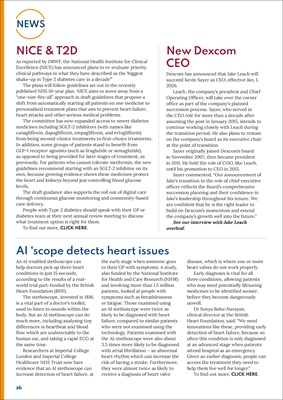
16
NEWS
NICE & T2D
As reported by DRWF, the National Health Institute for Clinical
Excellence (NICE) has announced plans to re-evaluate priority
clinical pathways in what they have described as the 'biggest
shake-up in Type 2 diabetes care in a decade"'
The plans will follow guidelines set out in the recently
published NHS 10-year plan. NICE aims to move away from a
"one-size-fits-all" approach in draft guidelines that propose a
shift from automatically starting all patients on one medicine to
personalised treatment plans that aim to prevent heart failure,
heart attacks and other serious medical problems.
The committee has now expanded access to newer diabetes
medicines including SGLT-2 inhibitors (with names like
canagliflozin, dapagliflozin, empagliflozin, and ertugliflozin)
from being second-choice treatments to first-choice treatments.
In addition, some groups of patients stand to benefit from
GLP-1 receptor agonists (such as liraglutide or semaglutide),
as opposed to being provided for later stages of treatment, as
previously. For patients who cannot tolerate metformin, the new
guidelines recommend starting with an SGLT-2 inhibitor on its
own, because growing evidence shows these medicines protect
the heart and kidneys beyond just controlling blood glucose
levels.
The draft guidance also supports the roll out of digital care
through continuous glucose monitoring and community-based
care delivery.
People with Type 2 diabetes should speak with their GP or
diabetes team at their next annual review meeting to discuss
what treatment option is right for them.
To find out more, CLICK HERE.
New Dexcom
CEO
Dexcom has announced that Jake Leach will
succeed Kevin Sayer as CEO, effective Jan. 1,
2026.
Leach, the company's president and Chief
Operating Officer, will take over the corner
office as part of the company's planned
succession process. Sayer, who served in
the CEO role for more than a decade after
assuming the post in January 2015, intends to
continue working closely with Leach during
the transition period. He also plans to remain
on the company's board as its executive chair
at the point of transition.
Sayer originally joined Dexcom's board
in November 2007, then became president
in 2011. He held the role of COO, like Leach,
until his promotion to CEO in 2015.
Sayer commented, "Our announcement of
Jake's transition to the role of chief executive
officer reflects the Board's comprehensive
succession planning and their confidence in
Jake's leadership throughout his tenure. We
are confident that he is the right leader to
build on Dexcom's momentum and extend
the company's growth well into the future."
See our interview with Jake Leach
overleaf.
AI 'scope detects heart issues
An AI-enabled stethoscope can
help doctors pick up three heart
conditions in just 15 seconds,
according to the results of a realworld
trial part-funded by the British
Heart Foundation (BHF).
The stethoscope, invented in 1816,
is a vital part of a doctor's toolkit,
used to listen to sounds within the
body. But an AI stethoscope can do
much more, including analysing tiny
differences in heartbeat and blood
flow which are undetectable to the
human ear, and taking a rapid ECG at
the same time.
Researchers at Imperial College
London and Imperial College
Healthcare NHS Trust now have
evidence that an AI stethoscope can
increase detection of heart failure, at
the early stage when someone goes
to their GP with symptoms. A study,
also funded by the National Institute
for Health and Care Research (NIHR)
and involving more than 1.5 million
patients, looked at people with
symptoms such as breathlessness
or fatigue. Those examined using
an AI stethoscope were twice as
likely to be diagnosed with heart
failure, compared to similar patients
who were not examined using the
technology. Patients examined with
the AI-stethoscope were also about
3.5 times more likely to be diagnosed
with atrial fibrillation - an abnormal
heart rhythm which can increase the
risk of having a stroke. Furthermore,
they were almost twice as likely to
receive a diagnosis of heart valve
disease, which is where one or more
heart valves do not work properly.
Early diagnosis is vital for all
three conditions, allowing patients
who may need potentially lifesaving
medicines to be identified sooner,
before they become dangerously
unwell.
Dr Sonya Babu-Narayan,
clinical director at the British
Heart Foundation, said: "We need
innovations like these, providing early
detection of heart failure, because so
often this condition is only diagnosed
at an advanced stage when patients
attend hospital as an emergency.
Given an earlier diagnosis, people can
access the treatment they need to
help them live well for longer."